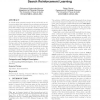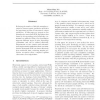1047 search results - page 84 / 210 » Learning the required number of agents for complex tasks |
ATAL
2004
Springer
14 years 1 months ago
2004
Springer
Multi-agent research often borrows from biology, where remarkable examples of collective intelligence may be found. One interesting example is ant colonies’ use of pheromones as...
MODELLIERUNG
2004
13 years 9 months ago
2004
: We consider socio-technical processes, i.e. processes where machines as well as humans participate. Typical examples occur in sales processes in e-commerce. Three modeling tasks ...
ATAL
2009
Springer
14 years 2 months ago
2009
Springer
In several agent-oriented scenarios in the real world, an autonomous agent that is situated in an unknown environment must learn through a process of trial and error to take actio...
JMLR
2012
11 years 10 months ago
2012
Reducing the number of labeled examples required to learn accurate prediction models is an important problem in structured output prediction. In this paper we propose a new transd...
ICML
2007
IEEE
14 years 8 months ago
2007
IEEE
We consider the problem of multi-task reinforcement learning, where the agent needs to solve a sequence of Markov Decision Processes (MDPs) chosen randomly from a fixed but unknow...


